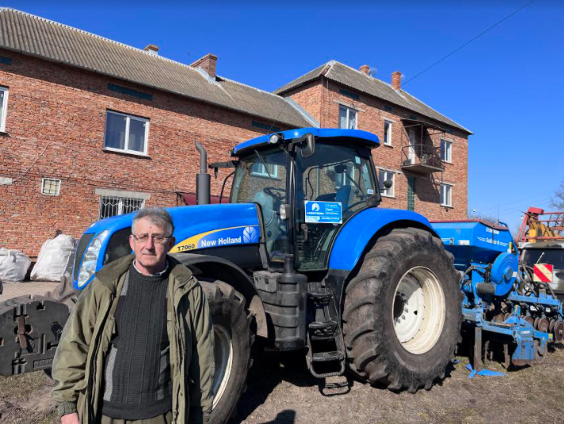A Day in the Ukrainian Countryside Discloses a Profound Patriotism
‘Everything for the front,’ Ukraine’s farmers say.

LVIV, Ukraine — A sense of calm pervades the Ukrainian countryside. Were it not for occasional sandbag and cinder block checkpoints manned by scruffy locals who eye press accreditations suspiciously, one could almost forget there’s a war on.
Soviet-era farm trucks and vintage Ukrainian tractors putter down potholed roads and compete for lanes alongside horse-drawn carts — repurposed automobile chassis serve as ersatz wagons. Freshly plowed fields offer a glimpse of Ukraine’s jet-black earth.
The Soviet Union called Ukraine its breadbasket. More recently, the country nourishes large parts of the Middle East and Africa and exports vast amounts of livestock feed to farms in western Europe.
In the face of the Russian invasion of Ukraine, and in recognition of the principle that an army marches on its stomach, farmers throw their granary doors wide open to the Ukrainian military.
At Otynevychi, an hour’s drive southeast of Lviv, Volodymyr Rever and his wife Oksana farm several parcels totaling 740 acres. Their holdings are typical for a family farm in the area.
Depending on the season and the market, they farm wheat, rapeseed, potatoes, carrots, cabbage, soybeans, and other vegetables. Some of their potato harvests are of such high quality that they’ve sold them to potato chip factories, Mr. Rever says proudly.
A tour of the Rever farmstead discloses just how much they’ve given to support their country. The couple explain they donated $8,800 worth of crops to feed the Ukrainian army, a sum totaling more than four times the median annual household income.
Inside their three-story farmhouse, they say that their eldest son joined the Ukrainian army in 2014 while in his early 30s. He still serves today in the army’s officer corps.
Although the Revers are allowed some contact with their son, security regulations don’t permit the parents to know where he is stationed or if he has been in combat.
When asked what the best-case scenario for this war would be, Volodymyr’s craggy face crinkles into a smile. “Best-case scenario?” he repeats. “We kick the Russians out of our borders and drink cheap beer in Moscow!”
More realistically, however, Mr. Rever explains that he’ll continue sowing and harvesting as long as conditions permit, adding that the crops would come in until the Russians are at the edges of the Rever fields.
Although Ukrainian forces and international volunteers are fighting the Russians on multiple fronts and stalling the Russian war machine, Mr. Rever lets slip just how deeply intertwined the two countries are, and how difficult a final divorce from Moscow would be.
The farmer nods to stacks of wooden crates filled with newly harvested vegetables, reciting a World War II-era Soviet war slogan. “Everything for the front,” he says. “Everything for victory.”
At Mistky, a village 45-minutes southwest of Lviv, Petro Vovk tills 670 acres of potatoes and other vegetables. He punctuates his homespun wisdom with quick humor, and gold teeth glint from his easy, frequent smiles.
Mr. Vovk’s grandparents were Kurkuls — relatively well-off, prosperous farmers. The Soviet state, though, made them pay for their entrepreneurial success: 14 years of labor in a Siberian gulag.
After serving their sentence, the Vovks returned to find they had nothing left, their land and holdings appropriated and redistributed by the state.
While the Vovk household does not pine for a return to collectivized Soviet farming, Mr. Vovk shows his appreciation for the Ukrainian state. Mr. Vovk explains that beside the vegetables he’s already donated to the Ukrainian army, he’d be more than willing to sell more for a symbolic price.
Small businesses benefit from the country’s new and voluntary 2 percent flat tax. Despite the new tax regime, Mr. Vovk will pay at the old rate “in full” both because he can afford it and to help “fill the state’s accounts” during this war.
The Vovk family farmhouse is a spacious, comfortable place. His family repurposed part of the second floor to host Ukrainians fleeing westward. “It is our responsibility to help those we can,” Mr. Vovk explained.
“In Ukraine there is life, there is hope,” the farmer affirmed, pointing out the irony that Ukraine’s “Russian-speaking cities” in the east are the ones Russian forces are razing.
Ukrainians are keenly aware of the global outpouring of support for their country, and the weapons sent by America and the United Kingdom are particularly appreciated. Over a plate of cookies, Mr. Vovk — a tea drinker — concurs.
Gesturing to a milk carton on the table, he explains with a deep belly laugh that in appreciation of British anti-tank weapons, he began taking his tea in the English manner — with milk.
When the Russian invasion began in 2014, Ukrainians didn’t feel the war to the degree they do now, Mr. Vovk explains. The renewed offensive has made the war tangible, even for those not directly affected by the fighting.
Before the invasion, “an anthem, a flag, an independence day were enough,” the farmer muses. “But now we have to fight for it.”
Unprompted, Mr. Vovk echoes Mr. and Mrs. Rever’s sentiments verbatim. “Everything for the front,” he says, pointing a calloused finger at his potato fields through the window. “Everything for victory.”
_______
Correction: Petro Vovk and Volodymyr Rever are the names of the Ukrainian farmers interviewed in this article. Their surnames were stated incorrectly in an earlier edition.

